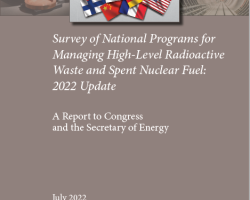Category of Content
Siting Experience Documents Only
Publication Date
Subject Matter
Influence of Nuclear Fuel Cycles on Uncertainty of Long-Term Performance of Geologic Disposal Systems
Influence of Nuclear Fuel Cycles on Uncertainty of Long-Term Performance of Geologic Disposal Systems
Covariance Data for Used Nuclear Fuel Uncertainty Analysis
Covariance Data for Used Nuclear Fuel Uncertainty Analysis
Guidance for Creating a Community Benefits Plan for Regional Direct Air Capture Hubs
Guidance for Creating a Community Benefits Plan for Regional Direct Air Capture Hubs
This document is intended to provide supplemental information to assist applicants developing a Community Benefits Plan (CBP) for the Regional Direct Air Capture Hubs. As shown in the graphic to the right, Community Benefits Plans are based on a set of four core interdependent policy priorities: engaging communities and labor; investing in America's workforce; advancing diversity, equity, inclusion, and accessibility; and implementing Justice40.
Interim Storage, Environmental Justice, and Generational Equity
Interim Storage, Environmental Justice, and Generational Equity
With the termination of the Yucca Mountain project, which was proposed to be our nation’s first repository for the disposal of military and civilian spent nuclear fuel and high-level radioactive waste, the future of nuclear waste management and disposal in this country became increasingly uncertain. Interim storage has been advocated by many as a temporary solution while a permanent solution is studied for potentially several more decades to come.
Policies for Achieving Energy Justice in Society: Best Practices for Applying Solar Energy Technologies to Low-Income Housing
Policies for Achieving Energy Justice in Society: Best Practices for Applying Solar Energy Technologies to Low-Income Housing
Studies indicate that the energy burden — energy costs as a percentage of annual family income — on low-income families is inordinately high, compared to that of the rest of the population. Rising fuel costs exacerbate this problem. Residential solar energy systems can help address this situation by furnishing a price-stable energy source with the added benefit of reduced greenhouse gas emissions. However, without appropriate incentives, these systems are prohibitively expensive for low-income families.
Reset of America's Nuclear Waste Management Strategy and Policy
Reset of America's Nuclear Waste Management Strategy and Policy
The U.S. nuclear waste management program has labored for decades at a cost of billions of dollars each year, and yet there is still no active disposal program either for spent nuclear fuel from commercial reactors or for the high-level radioactive legacy waste and spent nuclear fuel from defense programs.
Interim Storage, Environmental Justice, and Generational Equity
Interim Storage, Environmental Justice, and Generational Equity
With the termination of the Yucca Mountain project, which was proposed to be our nation’s first repository for the disposal of military and civilian spent nuclear fuel and high-level radioactive waste, the future of nuclear waste management and disposal in this country became increasingly uncertain. Interim storage has been advocated by many as a temporary solution while a permanent solution is studied for potentially several more decades to come.
Communicating Risks and Benefits: An Evidence-Based User's Guide
Communicating Risks and Benefits: An Evidence-Based User's Guide
Effective risk communication is essential to the well-being of any organization and those people who depend on it. Ineffective communication can cost lives, money, and reputations. Communicating Risks and Benefits: An Evidence-Based User's Guide provides the scientific foundations for effective communication.
Survey of National Programs for Managing High-Level Radioactive Waste and Spent Nuclear Fuel: 2022 Update
Survey of National Programs for Managing High-Level Radioactive Waste and Spent Nuclear Fuel: 2022 Update
In October 2009, the U.S. Nuclear Waste Technical Review Board (Board or NWTRB) published Survey of National Programs for Managing High-Level Radioactive Waste and Spent Nuclear Fuel. For each of the 13 national programs studied, the report catalogued 15 institutional arrangements that had been set in place and 15 technical approaches that had been taken to design repository systems for the long-term management of high-activity radioactive waste.

